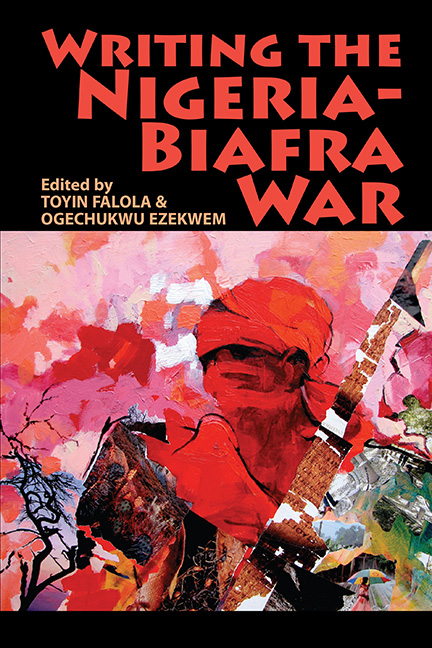Book contents
- Frontmatter
- Contents
- Notes on Contributors
- List of Abbreviations
- Timeline
- Map of Biafra 30 May 1967 – 1 May 1969
- 1 Scholarly Trends, Issues, and Themes: Introduction
- Part I On The History Of The Nigeria-Biafra War
- Part II Critical Debates On The Nigerian Crisis
- Part III The War In Fiction, Memoir, And Imagination
- Part IV Locating Gender In Nigeria-Biafra War Literature
- Select Bibliography
- Index
21 - Female Participation in War and the Implication of Nationalism: The Postcolonial Disconnection in Buchi Emecheta’s Destination Biafra
Published online by Cambridge University Press: 17 June 2021
- Frontmatter
- Contents
- Notes on Contributors
- List of Abbreviations
- Timeline
- Map of Biafra 30 May 1967 – 1 May 1969
- 1 Scholarly Trends, Issues, and Themes: Introduction
- Part I On The History Of The Nigeria-Biafra War
- Part II Critical Debates On The Nigerian Crisis
- Part III The War In Fiction, Memoir, And Imagination
- Part IV Locating Gender In Nigeria-Biafra War Literature
- Select Bibliography
- Index
Summary
Introduction
War is a subjective experience defined by idealistic whims of leadership through which leaders seek to maintain a system of ideological participation. Further, war is purposeful as one group attempts to destroy or weaken the other in order to gain greater access and/or control, or convert the other into a form more beneficial to the dominant group. It starts as an idealism that results in disruptions such as, victimization, rebellion, and resistance, and it finally ends in conflict. Often, violence, victimization, and genocide are major consequences of war ignited in the ‘spirit of patriotism’.
Nigeria as a nation is vast in territory, diverse in ethnicity and language, and has been confronted with issues of disputed borders and boundaries. With a history of violent conflicts, Nigeria's first major experience of political transition was marked by military coups, geopolitical rebellion, and civil war from 1967 to 1970 (indicated as a nationalist/liberation war with ethnic-political undertones), which have resulted in historical and fictional literary works. The Civil War of 1967–1970 was the culmination of the geographical contradictions and political imbalances that existed in the nation since she came under colonial occupation. The geographical contradictions depict elements of tribalism/ethnicity, political and ideological ‘accidentals’ of the Western economic agenda, administrative miscalculations, local political rivalries, the 1963 census recount, the 1964/65 election, borders and boundaries disparities, dominant ethnic control, the discovery of and struggle for control of oil wealth, and individual betrayal and disillusionment.
This chapter focuses on Buchi Emecheta's fictionalization of the historical ‘accidentals’ of the 1967–1970 ‘pogrom’ – termed the Biafran War. Her work focuses on the struggle for national and ethnic identities, female participation, the negotiation of identity performance, and conflict resolution. It also focuses on the consequences of these historical ‘accidentals’ on the current political dispensation from a futuristic literary perspective. Emecheta's Destination Biafra (1983), as a part of a womanly, fictional continuum that helps define national and individual identities, is a narrative placed within a specific cultural location and context. On the one hand, she explores the points of conflict between the dominant identities represented by the West, the political leaders, and the Army, who latched on the manipulation of ethnic sentiments in their bid to access and control the oil wealth. On the other, the dominated identities are represented by the masses, particularly the women, in the pursuit of nationalism, personal rediscovery, and development.
- Type
- Chapter
- Information
- Writing the Nigeria-Biafra War , pp. 454 - 476Publisher: Boydell & BrewerPrint publication year: 2016

